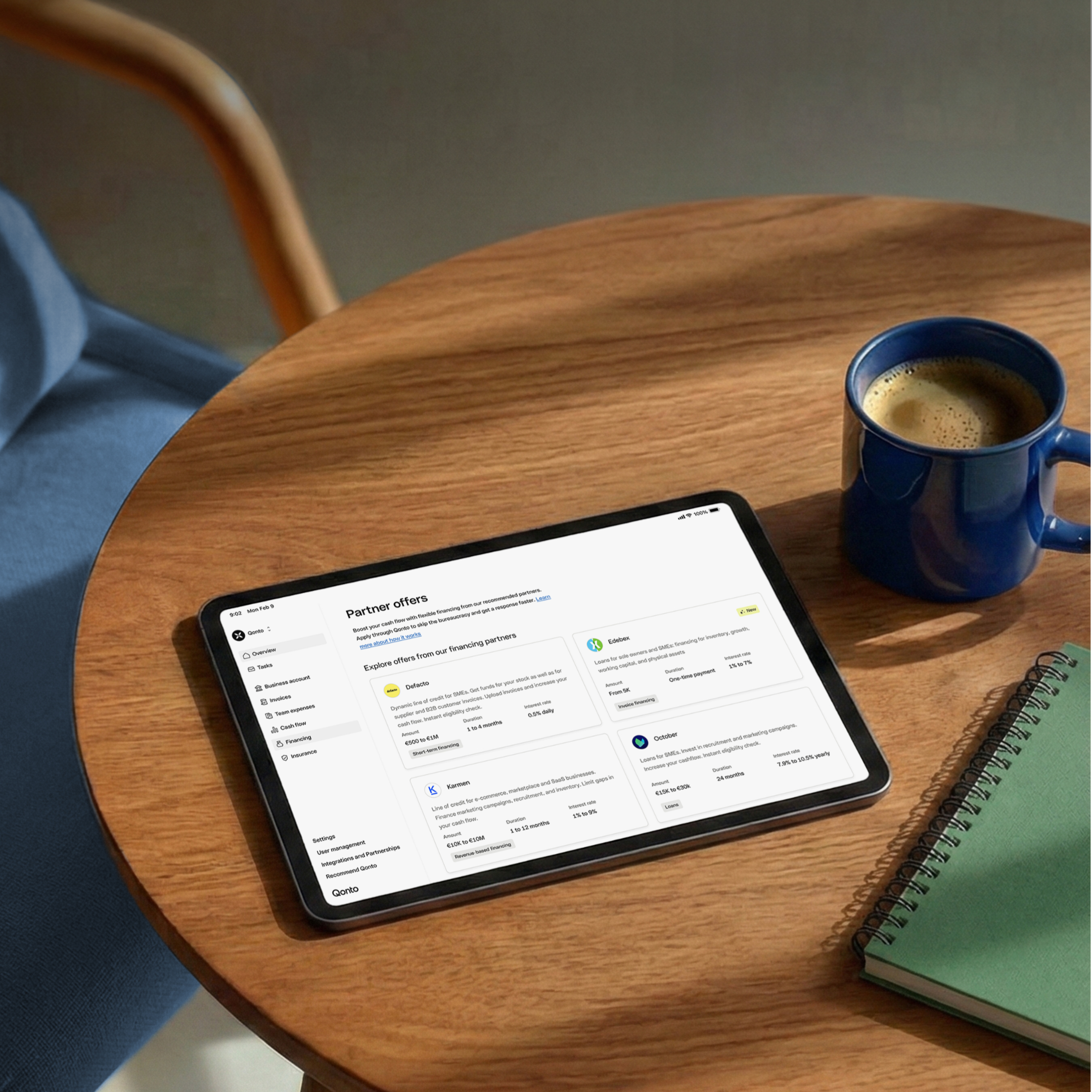Get financing through our partners
Choose the right business financing deal for you from our selection of partner offers. Enjoy a speedy application process that’s 100% online, with no hidden costs.

Financing partners to help you thrive
Banxware
Defacto
Silvr
Iwoca
Financing type
Revenue-based financing
Short-term financing
Short-term financing
Short-term financing
Amount
€1,000 to €250,000
€500 to €1 million
€10,000 to €1 million
€1,000 to €500,000
Repayment period
3 to 12 months
1 to 4 months
1 to 12 months
1 to 24 months
Interest rate
2.5% - 26.3%
0.03% - 0.08% per day
5% -9%
from 1% per month
Payout time
24 hours after approval
Immediately after approval
48 hours after approval
Immediately after approval
Required time in business
At least 6 months
At least 4 months
At least 6 months
At least 2 months of operational activity
Company location
Germany
Germany or France
Germany or France
Germany
Accepted legal forms
Sole proprietorship, e.K., GbR, GmbH (& Co. KG), UG, OHG.
AG, GmbH, UG, GmbH & Co. KG.
GmbH, UG, AG, sole proprietorship, GbR, OHG, sole trader / e.k. (merchant), KG, GmbH & Co.KG.
All German legal forms
Legal requirements
No personal guarantee or personal collateral required
No bankruptcy proceedings in the last 24 months.
No personal guarantee or personal collateral required
No collateral required (guarantee for corporations)
Special conditions
-
Only business email addresses are accepted.
Financing available to businesses from all sectors and industries; only professional email addresses are accepted
-
Financing type
Amount
Repayment period
Interest rate
Payout time
Required time in business
Company location
Accepted legal forms
Legal requirements
Special conditions
Revenue-based financing
Short-term financing
Short-term financing
Short-term financing
€1,000 to €250,000
€500 to €1 million
€10,000 to €1 million
€1,000 to €500,000
3 to 12 months
1 to 4 months
1 to 12 months
1 to 24 months
2.5% - 26.3%
0.03% - 0.08% per day
5% -9%
from 1% per month
24 hours after approval
Immediately after approval
48 hours after approval
Immediately after approval
At least 6 months
At least 4 months
At least 6 months
At least 2 months of operational activity
Germany
Germany or France
Germany or France
Germany
Sole proprietorship, e.K., GbR, GmbH (& Co. KG), UG, OHG.
AG, GmbH, UG, GmbH & Co. KG.
GmbH, UG, AG, sole proprietorship, GbR, OHG, sole trader / e.k. (merchant), KG, GmbH & Co.KG.
All German legal forms
No personal guarantee or personal collateral required
No bankruptcy proceedings in the last 24 months.
No personal guarantee or personal collateral required
No collateral required (guarantee for corporations)
-
Only business email addresses are accepted.
Financing available to businesses from all sectors and industries; only professional email addresses are accepted
-
Apply for financing in just a few clicks
Your questions about financing
The eligibility criteria vary depending on the partner company. Generally, your business’ eligibility for financing will be determined by the following factors:
- how long your company has been active,
- how long you’ve had a Qonto business account,
- your company’s location,
- its revenue,
- tax considerations.
Additional factors, such as your company’s growth potential or its proportion of equity, can increase your chances of obtaining financing. However, it's important to emphasize that Qonto cannot guarantee that you will receive financing, even if you meet all the criteria. Ultimately, the decision lies with the respective partner company to accept or reject your financing application.
Most companies need funds to strengthen their business growth or expand their operations. Among the primary financing methods for businesses are:
Equity
Equity financing is a key factor in establishing a company. To cover financial needs, company partners make capital contributions. For instance, this includes the minimum capital contribution of €1 when setting up a UG (Unternehmergesellschaft) or deposit of €25,000 when establishing a GmbH (Gesellschaft mit beschränkter Haftung). This capital can be provided either in cash or as in-kind contributions (for example machinery, land or other assets). When setting up a GmbH, at least 50% of the share capital (€12,500) must be paid in.
As a company grows, it may be necessary to increase equity. In this case, partners have various financing options:
- capital increase through new contributions,
- introduction of funds from the current account of a business partner,
- raising external capital.
In Germany, there are also various government institutions and programs that can offer financial support to businesses. The main advantage of this financing method is that businesses are typically not obligated to repay the granted amounts.
Business Loans
Many firms prefer business loans as a source of financing. However, it's not always easy for entrepreneurs to convince banks to grant them a loan.
Banks always try to minimize the risk of business failure. Therefore, they often demand a significant contribution from the borrower as a deposit, usually between 10% and 50% of the borrowed amount. In addition to this personal contribution and a convincing business plan, banks require collateral from the borrowing company or its partners before granting a loan. These securities can include:
- guarantees: there are private guarantees and citizens' associations in Germany,
- a security over a portion of the company's capital,
- other external financing means.
If you don't have sufficient funds and/or personal contributions to persuade banks to lend you money, there are other options. If you want to buy equipment or property, leasing can be a good alternative. For this, contact specialized leasing companies that buy these assets and then rent them to you. At the end of the leasing contract, you have three options:
1. Return the asset to the leasing company.
2. Extend the leasing contract.
3. Purchase the asset at a reduced price that takes into account the payments you’ve already made.
Factoring
Another solution for businesses wanting to improve their liquidity is invoice factoring. Through factoring, companies can ‘sell’ their outstanding invoices to a factoring company, which then takes over the collection of the invoiced sums. In addition to covering short-term financing needs, factoring protects the company from unpaid debts from its customers. The factoring company pays you the invoice amount minus a fee they retain for their services. This fee is usually between 0.5% and 5% and includes interest and factoring fees.
Crowdfunding
Crowdfunding is another external financing source that’s suitable for many small and medium-sized businesses. Choosing a crowdfunding platform allows companies to quickly raise money from private investors. Rather than being an alternative to bank credit, crowdfunding often complements a business loan.
If your business project has high growth potential, you can turn to venture capital firms or experienced private investors, known as business angels.
If you wish to start a new company, there are various financing options available to you, including bank loans. However, most banks typically require equity participation before they meet your financing needs.
If you can't provide your own capital contribution, there exist alternative sources of financing:
- Look for partners, especially if your venture has high growth potential.
- Consider applying for an unsecured loan from specialized organizations.
- Seek financial support from friends or family members.
- Initiate a crowdfunding campaign to generate investments from individuals.
- Consider taking out a micro-loan. These are usually limited to €10,000 and are particularly suitable for low-risk projects like craft activities.
Other financing options include:
Bootstrapping (self-funding)
Advantages: full control, no debt/equity obligations, flexibility
Disadvantages: limited funds, personal risk, slow growth
Subsidized loans
Advantages: favorable interest rates, longer repayment terms
Disadvantages: lengthy application process, strict conditions
Venture Capital
Advantages: access to large sums, VC expertise
Disadvantages: loss of shares, pressure for high returns
Government subsidy programs and scholarships
Advantages: no equity loss, networking opportunities
Disadvantages: complex application processes, specific criteria
Incubators
Advantages: access to resources, intensive support
Disadvantages: possible share relinquishment, influence on management
Accelerators
Advantages: expert knowledge, access to investors, growth support
Disadvantages: time-consuming, possible share relinquishment
Startup competitions
Founders present ideas in front of a jury.
Rewards are often in the form of startup capital and/or guidance.
Despite the required securities and personal contributions, taking out a business loan offers several advantages:
Maintaining control over the business
When you approach a bank or another lender to finance your company, you retain full control of your business since the loan is not considered equity. By taking out a loan, you maintain complete control over the direction of your company, rather than relinquishing a degree of control of your business to third parties.
In addition to addressing your short-term financing needs, with a business loan you can finance any project within your company, such as:
- investments in equipment or machinery,
- increasing your inventory.
The main advantage of a loan over other sources of financing is that you can tailor the term of the financing to your needs. This way, you maintain a clear view of your repayments and cash flow.


